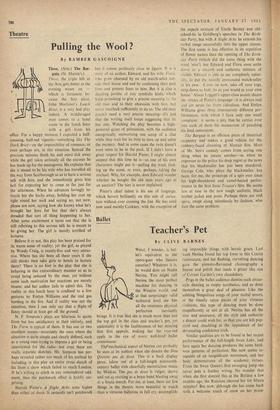Theatre
Pulling the Wool ?
By BAMBER GASCOIGNE Three. (Arts.) The Bar- Believe it or not, this play has been praised for its warm sense of reality; yet the girl, as played by Wendy Craig, is twenty-five and very attrac- tive. Where has she been all these years if she still thinks men take girls to hotels to lecture them? There is no hint in the play that she is behaving in this extraordinary manner so as to avoid being seduced by the man, yet without some Such motivation her reactions are merely insane; and her author fails to admit this. The reality in this lunch hour is confined to a few gestures by Emlyn Williams and the real gas burning in the fire. And if reality was not the intention, then I can only say that a flight of fancy should at least get off the ground.
N. F. Simpson's plays are hilarious to quote from but less satisfactory in their entirety, and The Form is typical of them. It has one or two excellent scenes—invariably the ones where the situation is quite simple and clearly defined, such as a young man trying to iitipress a girl or being interviewed for the radio—but even these are really separate sketches. Mr. Simpson has per- haps revealed rather too much of his method by including in this play an entire revue sketch of his from a show which failed to reach London. If he's willing to stitch in any remaindered odd- ment, then the patchwork effect is hardly sur- prising.
Harold Pinter's A Slight. Ache, aims higher than either of these. It certainly isn't patchwork but it comes perilously close to jigsaw. It is a story of an author, Edward, and his wife, Flora. r. ho grow obsessed by an old match-seller out- side their house and end by confessing their past lives and present fears to him. But it is also a dazzling jumble of tiny symbolic hints, which keep promising to give a precise meaning :.) the old man and to their obsession with him, but never interlock sufficiently to do so. The old man doesn't need a very precise meaning—it's just that the writing itself keeps suggesting that he has one. Watching the play becomes a high- powered game of pelmanism, with the audience energetically memorising one scrap of a clue while they wait for its twin to turn up and solve the mystery. And in some cases the twin doesn't even seem to be in the pack. If I didn't have a great respect for Harold Pinter, I might almost suspect that this time he is—as one of his own characters might put it—pulling the wool, foul- ing up the scent, or even, perhaps, taking the michael. Why, for example, does Edward wonder whether he bought the old man years ago at an auction? The hint is never explained.
Pinter's chief talent is his use of language, which hovers brilliantly on this side of carica- ture without ever crossing the line. He has until now used mainly Cockney, with the exception of the superb mixture of Uncle Barney and old- school-tie in Goldberg's speeches in The Birth- day Party, but with A Slight Ache he extends his verbal range successfully into the upper classes. The first scene is less effective in its repetition of flower names than the opening of The Birth- day Party (which did the same thing with the word `nice'), but Edward and Flora soon settle down to a smooth and authentic mixture of cliches. Edward is able to say completely natur- ally, to put the heavily overcoated match-seller at his ease: 'Come on now, take off your togs, strip down to bull, do as you would in your own house.' Alison Leggatt's upper-class accent shares the virtues of Pinter's language—it is always real and yet never far from ridiculous. And Emlyn Williams gives three impressively different per- formances, with which I have only one small complaint: it seems a pity that he carries over into each of them his mannerism of punching his final consonants.
The Bargain is an efficient piece of theatrical carpentry and makes a good vehicle for the rubbery-faced clowning of Alastair Sim. Most of Mr. Sim's comedy comes from saying one thing when he means another—as when he expresses to the police his deep regret at the news that his blackmailer has just been murdered. George Cole, who plays the blackmailer, has been, for me, the prototype of a spiv ever since his high-shouldered and camel-haired perfor- mance in the first Saint Trinian's film. He seems less at ease in the new tough uniform, black leather jacket and jeans. Perhaps there are real spivs, swept along relentlessly by fashion, who face the same problem.










































 Previous page
Previous page